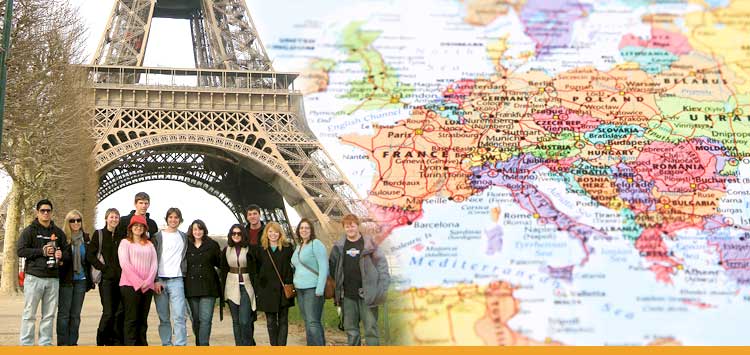2007 European Odyssey
Welcome to the European Odyssey Web site, where we followed the experiences of 14 students and their two professors as they traveled through Europe in one of the most unique study abroad opportunities ever offered.
For 10 weeks - from February 23 to May 5, 2007 - this semester-long program allowed the students to study European history, politics and culture in the context of the developing European Union. This interdisciplinary program also challenged the students as individuals who must work within a group setting to learn, live and thrive.
About the Program
On February 23, 2007 14 students and 2 professors embarked on a 10-week, semester-long program that allowed the students to study European history, politics and culture in the context of the developing European Union. This interdisciplinary program also challenged the students as individuals who had to work within a group setting to learn, live and thrive.
Though other schools offer study abroad opportunities, there are none of which we are aware that offer a 10 week mobile classroom covering as many countries and cities as this "Odyssey." Travel was by minivan. Accommodations were in youth hostels and inexpensive hotels.
According to Hofstra Political Science Professor Linda Longmire, the structure of the European Odyssey course is based on the same ideals as the European Union: unity and diversity. Many of the countries on the tour, now partners in the EU, at some point in their histories may have been enemies or isolated from one another. Professor Longmire says, "As the students contemplated the unity and diversity of the countries on our itinerary, they worked on their own partnership. They needed to work and travel as a team while holding onto and appreciating the interests and qualities that distinguish them as individuals."
The students came from a variety of different backgrounds and courses of study. Some were from New York while others hailed from as far away as Utah and California. For many of the students, it was their first time abroad.
Sponsored by Hofstra University's New College, the Odyssey programs have been ongoing since 1990, though this was the first one to take place for an entire semester. Hofstra graduates from past European and American Odyssey programs have called it a life-changing, transformative experience.
Coursework examined both historical and contemporary topics in each country and region. It was a 16-credit course comprised of 12 credits of coursework and a four credit independent project. The first aspect of the coursework focused on the ancient and medieval roots of European civilization. Students visited Olympia, the home of the Olympic games; the Acropolis and the Parthenon in Athens; as well as the Coliseum and Pantheon in Rome. The second part of the course was devoted to understanding the contemporary, political, economic and sociological landscape of Europe. This was complemented by excursions to the European Parliament in Strasbourg, Brussels and the EU Court of Justice in Luxembourg. The third and final aspect of the program was an examination of human values and human rights in the context of the history and culture of WWII and the post war era in Europe. This part of the trip included a stop at Terezin, the Czech concentration camp.
Faculty
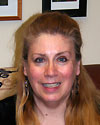
Linda Longmire
Professor and Teaching Fellow of Political Science
Linda Longmire, Ph.D. is Professor of Political Science at Hofstra University, where she teaches Women's Studies, International Politics, and Political Theory. She is the Director of New College's European Odyssey Program and the Co-Director of the Italian Odyssey Program. She is also the Producer and Host of a weekly radio show, "Visions and Choices" on WRHU, 88.7 FM, Radio Hofstra University.
Office: 103A Roosevelt Hall
E-mail | Web Page | Bio
Voice: (516) 463-5828
Fax: (516) 46(516)463-4832
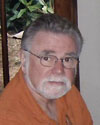
Timothy Smith
Professor Emeritus of Foundations, Leadership & Policy Studies
Timothy H. Smith, Ed.D. is Professor Emeritus of the Foundations, Leadership and Policy Studies Department at the School of Education and Allied Human Services at Hofstra University, where he has taught Philosophy of Education, Cross-Cultural Education and Ethics for Educators. He also teaches Human Values and Human Rights in Modern Europe in New College's European Odyssey Program and Educational Psychology in the SOEAHS’s Summer in Sorrento program.
Office: 277 Hagedorn Hall
E-mail | Bio
Voice: (516) 463-5773
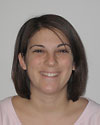
Lori Jacobson
L.M.S.W., European Odyssey alumna
Lori is a social worker at New York Presbyterian Hospital-Weill Cornell Medical Center. She graduated from Hofstra University in 2004 with a bachelor of arts in family studies. Lori participated in the European Odyssey Program during the spring of 2003. During her time at Hofstra, she was actively involved with Hillel, serving as president during her senior year. Lori graduated from Columbia University in 2006 with a master’s of science in social work.
Lori assisted Professors Longmire and Smith with the orientation classes for the European Odyssey, and she is meeting the group in Paris to work on more team building exercises for the first 10 days of the trip. Lori says her European Odyssey experience, which was seven weeks long, taught her a lot “about Europe, community building and myself. I define it as my most important experience at Hofstra.”
Among the challenges she says this year’s Odyssey group will face is the lack of personal space. “It is difficult to travel in a group like this for four months. The honeymoon period will end pretty quickly and they will have to work hard to keep their group together.”Students
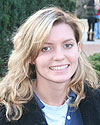
Amanda Bowker
Amanda, 19, is a sophomore from Merrick, New York. She is interested in art, religion, photography and music, and she is involved with the Psychology Club on campus. What drew her to the European Odyssey program is "the chance to explore and learn about amazing places and different people outside of America. This is a once in a lifetime opportunity. It's unbelievable how many countries we'll be visiting in 10 weeks."
Amanda says she is most looking forward to visiting Greece, Croatia and Italy. She hopes the experience will help her gain "a better understanding of people coming from all different types of backgrounds; a clearer idea of what I would like to do for a living; and a lot of pictures!" This will be her first trip to Europe.
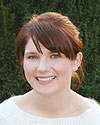
Laura Comer
Laura, 18, is a sophomore from Strongsville, Ohio. A political science major, Laura cites "lobbyist and senator" among her career goals. Her extra curricular activities include the Honors College Service Corps and Hofstra Hillel.
Laura has never been to Europe before and says she was interested in the European Odyssey because, "It will be the only time I'll be able to experience 12 different countries in the same trip." She hopes the opportunity will give her "an international understanding of different cultures, as well as improved packing skills!" She is most looking forward to visiting Greece and the Czech Republic.
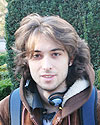
Christopher DeLuca
Christopher, 20, from Bogota, New Jersey, is a junior at Hofstra majoring in creative writing. In the future he hopes to become a screenplay writer, novelist and humorist and also to continue as a drummer. His extracurricular activities on campus include the Hofstra Filmmaker's Club and Thursday Nite Live. He also is interested in Web site and video game development. Christopher enjoys skiing, ultimate frisbee and biking.
When asked what interested him in the European Odyssey, Christopher says, "When can you travel through 12 countries in 10 weeks? It's sort of a pilgrimage, a culling of artistic and experimental resources that cannot be achieved in a classroom." He says he is looking forward to visiting all the countries on the schedule, but specifically cites Italy and Greece. Christopher has previously been to France and England.
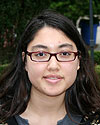
Rebecca Hom
Rebecca, 21, is a junior from Fremont, California who is majoring in sociology. She hopes to someday become a social researcher. Her extracurricular activities include the the Women of Achon, College Democrats and Circle K. Her special interests and hobbies include following political campaigns and exotic food.
She says, "I have never been to Europe before and I thought the European Odyssey would be the perfect way to learn about Europe." She is most looking forward to visiting Croatia, Slovenia and the Czech Republic. This will be her first trip to Europe.
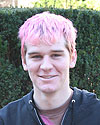
Kurt Juergens
Kurt, 19, is a sophomore from Strongsville, Ohio. He is majoring in both mechanical engineering and theatrical design and hopes someday to be a “Disney Imagineer.” He is involved with Hofstra Hillel and does volunteer work through Hofstra University Honors College.
Kurt’s hobbies include board games and horseback riding. He is well-traveled, having been before to France, England, Scotland, Wales, Ireland, Brazil, Mexico, Canada and Japan. On the European Odyssey he is most looking forward to visiting “Belgium for the waffles!”
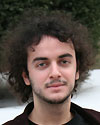
David Kortava
David, 21, is a Hofstra junior from Old Tappan, New Jersey, who is majoring in political science and philosophy. His extracurricular activities include Third Voice, Students for a Democratic Society and PHED (Program for the Higher Education of the Disabled).
He is most looking forward to visiting Slovenia and Germany on the European Odyssey, but has been abroad before in Ireland, England, the Czech Republic, Poland, Switzerland, France, Italy, Russia and Canada. David is hoping the European Odyssey will bring him “good times and some sort of enlightenment.”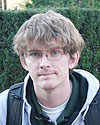
John Leonard
John, 21, is a junior from Salt Lake City, Utah who is majoring in creative writing. His main professional concern is someday finding a job that "pays me to be creative." John works at Hofstra's Axinn Library and is very interested in film.
The European Odyssey will be John's first trip off of North America. He is most looking forward to visiting Italy, because he has friends there. He says, "I can't imagine a better way to spend a semester," and hopes to grow as a writer and to make some lasting friendships during this experience.
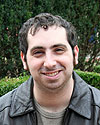
Steven Loeb
Steven, 20, is a junior from Flushing, New York. His major is film production and he hopes to someday be a film director or screenwriter. He is a member of the Hofstra Filmmakers Club and his hobbies include making short films and watching movies.
He says the European Odyssey, "is a chance to see the world, and especially go to places I would never have the chance to see otherwise." He says his is most looking forward to visiting "Germany, since my grandparents came from there. Also, the Czech Republic, since visiting a concentration camp will be an invaluable experience." This will be Steven's first trip to Europe and he hopes "to develop a deeper appreciation of the world and to become a more cultured person."
Genevieve Lysen
Genevieve Lysen, 21, of Lewiston, Maine, is a liberal arts major with concentrations in philosophy, political science and English.
Whatever career path she decides to take, this Hofstra junior knows she wants it to involve travel. “My favorite and most memorable times in my life have been when I was abroad.” Genevieve has already been to France, Italy, England, Ireland, Sweden, Denmark, Finland, Switzerland, Belgium, Canada and Ghana and West Africa.
She says, “I plan to get a master’s degree in journalism and be a travel writer and photographer. However, food and wine criticism has for years been in the back of my mind as a career path as well.” Back home Genevieve is a line cook and waitress at a gourmet restaurant. “I love growing, preparing and cooking food. I am particularly interested in sustainable agriculture and development – which will be the focus of my independent project while I am on the trip.”
Genevieve’s extracurricular activities at Hofstra include Women’s Club Lacrosse, the Philosophy Honors Society and the Philosophy Club. Her interests “include photography, writing, philosophy, politics and travel.”
She adds, “My family is more important to me than anything.” When asked about what attracted her to the European Odyssey program, Genevieve answers, “The variety of the countries we'll visit on the trip and in that, the opportunity to be immersed in so many diverse cultures, histories and traditions. I hope to gain a broader cultural, political and historical perspective and learn a little about myself along the way.”
The country she is most looking forward to visiting is Greece.
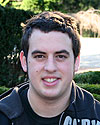
Patrick Maloney
Patrick, an 18-year-old sophomore, is a history major from South Kingston, Rhode Island. “The chance to see so many countries” is what drew him to the European Odyssey program.
Patrick hopes to someday join the Peace Corps and become a teacher. His interests include music, playing the drums, basketball and reading. He is most looking forward to visiting Italy. This will be his first trip abroad.
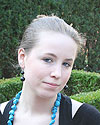
Katlyn Maze
Katlyn, 21, is a junior from Bridgeport, Connecticut who is majoring in international business. Her career goal is to become a buyer for an international clothing company, but she currently works on campus in the Hofstra University Bookstore and at the Box Office for the David S. Mack Sports Complex.
Among her hobbies and special interests are photography (Katlyn is the unofficial photographer for the International Business Association on campus), art, reading and spending time with family and friends. She is most looking forward to visiting Italy, Greece and France.
Katlyn has never been out of the country before and says she hopes the experience will give her "a cultural education, European flair and the opportunity to grow as a person." She also says that the Odyssey will give her the chance to see if there is any one particular country where she might want work if the opportunity was ever presented.
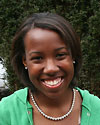
Christine Simon
Christine, 20, is a junior from Brooklyn, NY who is majoring in community health. Her career goals include working for an international health organization such as the World Health Organization or a non-governmental health group that also focuses on the economic development of nations. When asked about what attracted her to the European Odyssey program, Christine says, "I love to travel and to experience different cultures and societies. So I felt that the European Odyssey would be the best opportunity to do so while receiving credit towards graduation."
Christine is most looking forward to visiting France, Italy and Greece. She has previously traveled to England, India, Brazil, Thailand, Canada, Mexico, Panama, Jamaica and the Grand Cayman Islands.
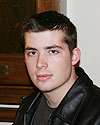
Anthony Triolo
Anthony, 20, is a junior who is majoring in sociology at Hofstra. Among his career goals are working with the FDNY and possibly starting his own business. His hobbies include surfing and snowboarding. He says "The experience of traveling and studying other cultures" are what drew him to sign up for the European Odyssey. He has never traveled abroad before and is most looking forward to studying in Italy.
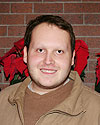
Brian Watson
Brian, 20, is a junior from Baltimore, Maryland whose major is anthropology. His career goals include working in curation, conservation or exhibit design at the National Museum of Natural History in Washington, D.C. He is a member of the Anthropology Club at Hofstra and he has always been interested in music.
This will be Brian's first trip to Europe. He says he signed up for the European Odyssey because, "The fact that you can see so much of Europe during one trip seems ideal for someone who has never been before. The grand tour allows you to discover places that you might want to come back to for a more complete visit."
He has studied French since the 7th grade and says he is most looking forward to visiting France. He hopes this experience will help him gain a better understanding of other cultures.
Itinerary
February 24 to 27: Paris
February 28 and March 1: Mont St. Michel, France
March 2: Carcasonne, France
March 3 to 5: Nice, France
March 6 to 8: Florence, Italy
March 9 to 12: Rome
March 13: Take the ferry from Brindisi to Igoumenitsa, Greece
March 14 and 15: Nafpaktos, Greece
March 16 and 17: Olympia, Greece
March 18: Monemvasio, Greece
March 19 to 21: Athens
March 22 to 24: Meteora, Greece
March 25: Ionnina, Greece
March 26: Take the ferry to Ancona, Italy
March 27: Pesaro, Italy
March 28 and 29: Bologna, Italy (tentative)
March 30 and 31: Pregnaziol, Italy (Venice)
April 1 and 2: Piran, Slovenia
April 3: Split, Croatia
April 4 and 5: Dubrovnik, Croatia
April 6 and 7: Split, Croatia
April 8 and 9: Ljubliana, Slovenia
April 10: Zagreb, Croatia
April 11 and 12: Budapest, Hungary
April 14 and 15: Vienna, Austria
April 16 and 17: Cesky Krumlov, Czech Republic
April 18 to 20: Prague
April 21 to 24: Berlin, Germany
April 25 and 26: Strasbourg, France
April 27 and 28: Luxembourg
April 29 and 30: Brussels, Belgium
May 1 to 3: Brugge, Belgium
May 4 and 5: Paris
May 6: Return to New York
Odyssey Journal
The students studying abroad with the European Odyssey program shared their thoughts in words, pictures and video as they learned more about foreign countries and cultures.
Back Safe and Sound

We are back safe, sound and hopefully fulfilled by our long, rich journey. After an emotional last day which included a trip to Versailles and a return to the Eiffel Tower and Montmartre, we had a last dinner together in Paris where we recalled the adventure with stories and photos. A September reunion has already been scheduled!
Thanks to the good parents who made our job so much easier!
End of our Odyssey

It is now the end of our Odyssey and for me it is a time to reflect on how I and the rest of the group have changed over the past 10 weeks. I feel like each of us has grown, everyone in a different way. We have learned so much on this trip, not only about new cultures around the world, but about ourselves as well. It helped that we had two of the best teachers/mentors/friends that we could have asked for. Both Tim and Linda have personally helped us all develop during our time together and were there for us every time we needed them. We can't thank them enough. I wish that every student at Hofstra could go on this trip. It was an invaluable experience that I would not trade for anything.
Student Movement in Greece

On June 2006 the New Democracy government led by the current President of Greece, Koras Koramnlis, proposed a education reform bill that threatens not only the future of education in Greece but is also a threat to the social welfare state in Greece. Under the provisions of the European social welfare state, education is free to all who attend. The students of Greece are not allowing this threat to continue uncontested. There has been a nation-wide protest among the Greek university students resulting in students occupying universities, participating in non-violent demonstrations and marches across Greece. Their protest is not just an opposition to local governmental changes, but is a part of a larger movement against neo-liberal reform that is corrupting the social welfare state, in which Europe has long standing foundations.
Christine 3-MAY-07
Winding Down

We are winding down the program and students are taking their final exams today. They've worked very hard, and I pleased with the amount of academic learning that has gone on addition to all of the exciting travel adventure. They've taken six quizzes in addition to their midterm and final exams, so they've been busy. They've also kept journals of their reactions and reflections throughout the experience. They've also had to conduct interviews in each country which we then share and evaluate weekly.
Each student also represented a country, becoming a specialist in its history, interests and aspirations. Last night we held a mini-summit in which each "diplomat" had to represent their country's position on a variety of subjects including border control, immigration, and the expansion of the EU to include Turkey. This group has been outstanding in terms of its academic performance, so we are feeling pedagogical fulfillment despite our fatigue!
Jewish Heritage

One of the greatest experiences for me on this trip was exploring my Jewish heritage in Eastern Europe. I visited synagogues and museums in Hungary, Vienna and Prague which survived World War II, as well as Terezin, a concentration camp in the Czech Republic. These overwhelming sites, which explored both the trouble-free, as well as the turbulent times, of Jewish communities in Europe helped me reconnect with my past and have a greater understanding of what it means to be Jewish.
One Week Left

We recently visited the European Parliament in Strasbourg and also had the pleasure of meeting with an official from the European Commission in Brussels. In Strasbourg the group had the opportunity to be in a plenary session while it was taking place. The MEPs were voting on issues ranging from homosexuality to economic monetary problems that Europe is facing today. The explanation for the votes was probably my favorite part. We got to actually hear why speakers would vote the way they did, and why it is important for the Parliament to recognize their opinion. One of the main explanations that stood out above the rest for me was a quote from a Polish official. He abstained from voting on a bill that would change the format of wording in an article dealing with homophobia, not because he disagreed with any or all discrimination against minorities, but because he believed there were more important issues in the world, such as Darfur, that need to be addressed first.
I would also just like to say thank you to Tim and Linda. The experiences they have helped me encounter on this trip have been life changing. Before coming on this trip I had very little knowledge about Europe and the European Union. Being a part of this experience has opened my eyes to many of the world's current issues. My interests in these issues will not end with the trip. This trip has taught me to be more aware about how other nations besides the U.S. deal with economic, political, and social dilemmas. Linda and Tim have inspired us to be proactive in this neo-liberal age we live in and become the architects of our own history. They have taught us that in these fast moving times we can no longer afford to be apathetic. Each of us can make a difference.
The European Union

After several months of studying the European Union and its institutions, it was exciting for everyone to visit the European Parliament in Strasbourg, France yesterday and see it in action. The challenge of crafting policy for 27 different nation states is daunting and hearing the array of languages engaged in vigorous problem solving together was inspirational. The Odyssey students learned so much from witnessing the dynamics of conflict resolution and participatory democracy as they were applied to concrete issues of common concern.
Less Than Two Weeks Left

We're down to less than two weeks of the trip left. It is so scary to think how fast it has gone, how much we have seen and that we still have so much more to do.
We were in Terezin a couple of days ago and that was mind numbing. It is one thing to read about a concentration camp, but it's something entirely different to walk through such a place. It is so disturbing to think that people could do this to other people; it makes me so ashamed of people in general that something like this happened.
Had I taken my own European Odyssey I probably would not have gone to a concentration camp as one of my stops. So I'm very appreciative of Linda and Tim and everything they have done for us and for everything they will continue to do for us. They have worked extremely hard to make this the best trip and to make sure all of us come away with a better knowledge of the world: past, present and future.
This trip has definitely changed my outlook on life. I have a much better appreciation for what has been given to me. I just want to say thank you to Linda and Tim for everything. I hope other students who read this will consider joining Linda and Tim on a future Odyssey. It is something you will never have a chance to experience outside of Hofstra. For everyone else who has read our journal entries, I hope you have enjoyed them and the pictures of our journey.
Human Trafficking

I am studying human trafficking for my independent project. I was excited to learn that there was going to be a Council of Europe regional seminar in Berlin on this topic. I was unable to attend the seminar, but I was able to get interviews with three men in German and Austrian government positions who had participated. Each person I interviewed was delighted to speak with me. It was refreshing to learn that politicians from other countries would speak with me.
I learned that Austria and Germany are both working hard on the problem of human trafficking. There is currently a need to specifically define what trafficking is in order to get comparable data. These numbers would help politicians and organizations in explaining the problem to the public, while law enforcement would have guidelines when it comes to determining if a crime has been committed.
Human trafficking is a widespread problem. So many countries and committees are working together to look at the many aspects. The politicians I spoke with are studying both prevention and protection.
Must Keep Traveling

Having been to so many places already it seems hard to believe that anyone could even think about picking up and going to even more places in such a short span of time. While visiting these cities, Vienna and Berlin specifically, a new flame for travel has been sparked. These cities are home to museums housing the archaeological collections of Ephesus (an ancient city in western Turkey on the Aegean coast that was a powerful seat for the ancient Greeks and then later the Romans) in Vienna and Pergamon (another ancient Greek site in western Turkey) in Berlin. Seeing both of these expansive archaeological collections during my current journey has motivated me to continue this amazingly life changing experience and investigate the archaeology of western Turkey further.
Notes from the Old Country

This journey across Europe has exposed me to perspectives long dead in the U.S., or dead to Washington and mainstream America anyway. The pied range of angels of ideology we have encountered encompasses everything from reactionary xenophobia and statism to broadminded anarcho-socialism.
In Athens, we spent the night in a university occupied by its students, all representing assorted forms of collectivism. The walls were tattooed with anarchy signs, sickle and hammers, and various politically charged aphorisms, the classrooms were bedrooms, and the mascots were a pack of large dogs protecting the activists.
This was just one occupied university of over 300 in Greece. “University asylum” renders universities here free-speech zones and police are barred entry. So in comfort and security, my new friends and I were given the opportunity to obtain hours of interview time with these young architects of history.
A Spectacular Week in Croatia

We’ve just completed a spectacular week in Croatia, traveling down and back the breathtaking Dalmatian Coast to the ancient cities of Zadar, Split and Dubrovnik. Though the infrastructure from roads to Internet is still developing, great steps forward are being made to make the country more accessible. Croatia was the first country we visited which is not part of the European Union. But its pristine waters reflect the highly evolved environmental consciousness of its people.
Yesterday one of our academic highlights was a moving and deep discussion of Hannah Arendt’s concept of the “banality of evil,” an attempt to unpack the horrors of WW II and other situations of unfathomable violence. It also helped us to better understand the 1991-1995 war in the former Yugoslavia, which led to the independence of Croatia. The “ethnic cleansing” which shocked the world during this time reminded us of the human potential for unspeakable crimes against humanity whose roots are often found in the incremental desensitization of everyday life.
I Love Slovenia

I have been so surprised at how much I love Slovenia. This is such a beautiful country. We have been to Piran and Ljubliana and both places -though vastly different from each other (the first being a quiet seaside town & the other a great little city) - instantly feel like home. The people are so friendly and amazing. The food has been awesome. The sights are beautiful. All in all Slovenia has been a great country that we have visited.
A Surreal Experience
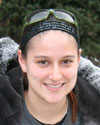
We are in Piran, Slovenia. I have to say I never in my life expected to be in this country. This whole experience has been surreal. Everyday I see or do something that I find hard to believe. I've become so close to some of the group members I can no longer picture my life without them. I don't want this trip to end - ever. I could do this for the rest of my life.
The knowledge I've gained about the history and politics of Europe would be impossible to replicate back home in a classroom. There's something so special about learning about the world you are a part of by experiencing it, rather than reading about it in a book. I've found that the interviews we are to conduct in each country may be one of the more memorable aspects of the whole experience. Getting opinions and thoughts firsthand about politicians, policies, cultures and conflicts could never be communicated through a textbook. I hate to leave every city because in each I find myself feeling connected to individuals that I know I will never see again. I feel like every day that I am here goes by faster.
On Greece and Paris

While we were in Olympia I had a chance to learn more about the "free" education in Greece. What we consider to be high school level does not properly prepare one for college under their free education system. If families in Greece can afford it, they send their child to public school in the mornings then pay for the child to attend private school in the afternoon. This results in twice the work load but a much better prepartion for college. I found that to be extremely interesting and very informative.
We were were in Paris, we visited Pere Lachaise Cemetary, and Linda split the group into smaller sections, giving each one four or five letters from the alphabet. Then each person within the group had to find someone with one of those letters as their last name. "R" was one of our group's letters. I found the memorial site of composer Gioacchino Rossini. Then while we were in Florence I visited his actual burial site in San Croce. Yesterday we were in his birth city of Pesaro. I found the three connections to be really interesting because it was by pure chance that I choose Rossini in the first place way back in Paris.
Leaving Greece

We just left Greece and I had an amazing time there. The countryside is incredibly beautiful and the people were so nice! First we went to Meteroa, a small town surrounded by giant rocks. Then we went to Athens, where we saw the sight of the first Olympic games! We made stops in Olympia and Monemvasia, before ending our stay in Nafpaktos on the Greek Independence Day. Greece is an incredible country and I hope that future Odysseans get the chance to go there as well.
Celebrating in Beautiful Nafpaktos

We are celebrating Greek Independence Day here in beautiful Nafpaktos, a small town at the edge of the Gulf of Corinth. There is a huge, new suspension bridge that spans the Gulf connecting the Peloponnesian Peninsula with northern Greece. Tomorrow on our way to the ferry back to Italy, we will stop at Dodona, the location of an ancient oracle described in earliest recorded history. Here are some fun facts about the place:
The shrine of Dodona was the oldest Hellenic oracle, according to the fifth-century historian Herodotus and in fact dates to pre-Hellenic times, perhaps as early as the second millennium BCE. Priests and priestesses in the sacred grove interpreted the rustling of the oak or beech leaves to determine the correct actions to be taken. When Homer wrote the Iliad (circa 750 BCE), no buildings were present, and the priests slept on the ground with ritually unwashed feet. Not until the fourth century BCE was a small stone temple to Zeus added to the site. By the time Euripides mentioned and Herodotus wrote about the oracle, priestesses had been restored. Dodona gained a reputation far beyond Greece. In Apollonius of Rhodes' retelling of the older story of Jason and the Argonauts, Jason's ship, the "Argo," had the gift of prophecy because it contained an oak timber taken from Dodona.
In the third century BCE, King Pyrrhus rebuilt the Temple of Zeus and added many other buildings and a festival featuring athletic games, musical contests, and drama enacted in a theater. At this time a wall was built around the oracle itself and its holy tree. In 219 BCE, the Aetolians invaded and burned the temple to the ground. Though King Philip V of Macedon rebuilt all the buildings bigger and better than before and added a stadium for annual games, the oracle at Dodona never fully recovered. In 167 BCE, Dodona was once again destroyed and later rebuilt 31 BCE by Emperor Augustus. By the time the traveller Pausanias visited Dodona in the second century AD, the sacred grove had been reduced to a single oak. Pilgrims still consulted the oracle until CE 391, when Christians cut down the holy tree. Though the surviving town was insignificant, the long-hallowed pagan site must have retained significance, for a Christian Bishop of Dodona attended the Council of Ephesus in CE 431. Archaeological excavations over more than a century have recovered artifacts, many of which are now at the National Archaeological Museum in Athens.
In Monemvasio

I was on the island town of Monemvasio, Greece with Steve, Katlyn, and Amanda this morning. We were aimlessly walking around and found the Aegean Sea on the edge of the island. The water was clear enough for me to see every rock and plant in the water. I peacefully sat on a rock just watching the water.
The Odyssey has been a whirlwind trip of big cities storming with tourists to small little towns where sitting watching the sea seems like the ideal choice. Sometimes I am so afraid of the end of this experiential learning adventure, but then I realize that I have seven more weeks. Each day is a new experience for which I am grateful.
Mind-blowing

Visiting Europe has always been a dream for me and to visit the continent the way the Odyssey allows you to is amazing. You really get a feel for each metropolis, small town, and everything in between. Visiting the places that I have learned about in school and from books since I was a child and to actually see the Acropolis in Athens, the Pantheon in Rome, and the Louvre in Paris has been mind blowing. I will never forget this unique experience.
A New Style of Learning

It is only week three, and I have learned more about Europe and the European Union especially, than I have my whole college career. The experiential technique and personal interview-style of learning are such a great way to access knowledge about current issues from the people who are actually dealing with them. Sitting in a classroom reading out of a textbook is one way to learn about Europe, but it’s hard to actually appreciate the history until you actually see the sites and have dialogue with the citizens that are living here during this historic time.
Unbelievable View

In Meteora, we visited the holy monastery of the great Meteoron, on the top of a huge rock formation. Some of us hiked all the way from town. That was by far the most unforgettable and rewarding experience I've had yet. It took three hours to get there. The view was unbelievable ... it made me feel so small. I would never have imagined that I'd be in such a beautiful and peaceful holy place.
Kali Spera

Kali Spera [Good Evening] from Meteora, Greece!
In this amazing place full of geological and historical uniqueness, I am reflecting on the process of community building as we wind up week three of the European Odyssey. I have spent much of my academic life focused on the meaning of community and the process of caring that is at its core, and I am continually impressed by the depth and quality of learning that this type of community on the road fosters. The inevitable conflicts and problems provide rich learning opportunities for growth and development. These are teachable moments in which we all can observe our strengths and weaknesses facilitating genuine personal transformation. Although this is my third Odyssey experience, I see things I've seen before in new ways and always delight in also seeing things through students' eyes.
An Experience

This trip has been an intense exercise in stress management. I have experienced and seen more than I have in any of my 21 other years. I realized today that since leaving New York, I have driven the length of France and Italy, and now I am sitting in a hotel in Greece. To this point alone, our journey is something that most people in the United States will never undertake. That is an astonishing fact considering the majority of our time traveling still lays ahead.
Having grown up in the isolated state of Utah, my idea of heavy travel was a six hour drive to Vegas. By the end of this trip, I will have been to 12 countries and eaten countless dinners picked simply by pointing at a menu. I owe a debt to our teachers for facilitating this beast of a program that will undoubtedly change my life forever.
Arriving in Greece

Yesterday we arrived in Greece. Docking the ferry at Igoumenitsa was so beautiful and the scenery was totally different from Italy. We drove up the mountains on twisty little roads, passing snow capped mountains and finally arriving at Kalembaki. From our hostel we are surrounded by huge rock formations. Today we hiked about three hours to Meteora. It was absolutely breathtaking. Tomorrow we head for Athens. Greece is wonderful!
Life-changing

This trip has already been life-changing, and it's only week two. I can't imagine the transformation that we will experience over the weeks to come. The group has come together and I feel like I have known everyone for years. I already consider some members family. We are soaking in so much beauty and history. At times it's overwhelming, but that's why we have one another - so we can go through this together.
I can't help but dwell on the fact that this trip will indeed be over at some point, and we will have to say goodbye to one another and to Europe. But for these next weeks I will try to make the most of every minute we have.
Florence is absolutely amazing. Walking the streets is like walking through an huge museum. Our hotel is amazing. It's comfortable but maintains the age, and integrity of the building, and all the furniture is antique. Dantés' wife was born on the first floor. It's about a two-minute walk from the Duomo (dome of the cathedral, Santa Maria del Fiore), so the location is ridiculous.
There are so many great restaurants and shops nearby. I love it here, but I can't wait for Rome!
Change is Inevitable

When you participate in the Odyssey program, change is inevitable. Whether you feel the changes as they are happening or become aware of trip’s impact years later, you experience a transformation and forever become a different person.
In 2003 I took my own leap of faith on the Odyssey and traveled with 14 strangers who became my “on the road family.” As I stepped out of my comfort zone, I learned about faith, patience, individuality, who I wanted to be and what I wanted to become.
I experienced moments when I shined and times when I was in a darker place. And at the end of that Odyssey I realized that although the trip was ending, the quest to find myself and experience life had just begun.
Since I returned from the European Odyssey in May 2003, there hasn’t been a day that I don’t reflect on that incredible experience and use the skills I learned from it.
Retracing my steps these past 10 days on this new Odyssey has been another life-changing experience. While I saw many of the same sites, I embraced the moments differently. I saw Europe, France and myself again in a new light.
I watched a new group of 14 college students begin their personal transformation.
My favorite way to live life is on the road, but for now my life is in New York. Although I am sad to be leaving France and my new “on the road family,” I leave with faith and hope that as they watch the sun rise and set, they too will be forever changed, always carrying the values and experiences they are learning close to their hearts.
A Nice Carnival

Last night the entire group went down into the main area of Nice for a Carnival. It was pretty amazing. We watched fireworks over the Mediterranean. Right before we watched the fireworks we came across a Calypso band playing; they were extremely talented and entertaining. Some of them were dressed up and dancing around; that was pretty neat to see. There was confetti everywhere you looked. There were also people going around spraying silly string on unsuspecting people; they caught a couple of people in our group. All in all Nice is a pretty amazing city but it kind of reminds me of Los Angeles with all the palms trees; so it's like Europe's LA.
We move on to Florence tomorrow; Italy here we come!
Looks like Italy

So we arrived in Nice, which is incredibly beautiful and looks like Italy. Technically it's in France, but it used to be in Italy before World War II. The whole city is built on and around a mountain range and the valley in the middle. All the houses are made of white stucco, and the roofs are brick colored slate. The weather is amazing; it hasn't rained once and the temperature hovers around 70°. There are even some palm trees, which I never expected to see in France of all places.
I'm actually writing from this great youth hostel; it used to be a rich family's villa and is built on the outskirts of town near the top of a mountain.
We also have free Internet and in-house meals (I'll be going for dessert as soon as this journal entry is done). Nice is also on the Mediteranean Sea, which is calm and exceptionally blue. The beaches are short and have no sand, but instead are covered with smooth rocks. Last night we went to the last day of Carnival, which is a big deal here. There were people spraying each other with silly string, a calypso band, and fireworks over the water. It was pretty incredible.
But enough about the awesome past - dessert pancakes await.
Warm, Sunny, Sultry Nice

We have just arrived in warm, sunny, sultry Nice and are enjoying the heat and light. Week One has been eventful but full of teachable, learnable moments!

The Bronze Ballerina
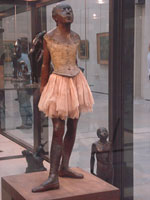

The Bronze Ballerina was made by Degas, and I have been wishing to see it for many years. Next to the Sistine Chaple, this is my other favorite work of art. The fact that I am seeing both up close and in person on this trip makes me extremely happy.

Going Wonderfully

Things are going wonderfully; however, we may have hit a snag. We heard that one of the vans was towed this morning. So far that’s the biggest snag we’ve hit. As unfortunate as the van being towed is, it was fortunate that we don’t need it until 6 p.m. anyway, so we have plenty of time to try and work things out before we have to leave for Mont St. Michel.
Already we’ve done so much that this day of having no coordinated activities feels nice.
Bonjour from Paris!

After a smooth, easy flight, the European Odyssey 2007 arrived at Charles de Gaulle airport where we picked up our brand new silver Renault mini-vans and found our way to Hotel Voltaire near the Republique Square. After flying all night it took the beauty of Paris to override our fatigue. But we wanted to stay awake in order to get our biorhythms adjusted to the six hour time difference. So after settling into our cozy hotel we took an initial, rather dreamlike spin around Paris stopping at the Eiffel Tower, the Arc de Triomphe, the Champs-Elysees, the Place de Concord and other Parisian landmarks. It's always a thrill to share the first moments of witnessing these historic symbols that students have imagined for years.
After a deep sleep we are out exploring Paris on a drizzly Sunday. Because the rain made an excursion to the famous Pere Lachaise cemetery a damp and chilly choice, we decided to see the gargantuan D'Orsay Museum today and postpone the earlier plan for the day. Tomorrow we'll visit the great Louvre Museum, one of the sites of cultural pilgrimage on our long journey through western civilization. People are sometimes worried about the "attitude" that the French can have, particularly towards Americans. But after seeing Paris our hope is that students come to appreciate the amazing reality of French history and culture that lies behind this stereotype. After seeing Paris we can better understand the pride of this extraordinary society whose beauty we feel fortunate to share.
Back Home

I'm going to miss my family and friends the most. Things will go on as usual even though we won't be here.

Fear and Excitement

What I'm most nervous about is not knowing what to expect on the trip; but that's also what I'm most excited about.

Anticipation

I can't wait until the anticipation is all over and the group is standing at the base of the Eiffel Tower having our first picture taken in Europe!
Student Movement in Greece

On June 2006 the New Democracy government led by the current President of Greece, Koras Koramnlis, proposed a education reform bill that threatens not only the future of education in Greece but is also a threat to the social welfare state in Greece. Under the provisions of the European social welfare state, education is free to all who attend. The students of Greece are not allowing this threat to continue uncontested. There has been a nation-wide protest among the Greek university students resulting in students occupying universities, participating in non-violent demonstrations and marches across Greece. Their protest is not just an opposition to local governmental changes, but is a part of a larger movement against neo-liberal reform that is corrupting the social welfare state, in which Europe has long standing foundations.
In Europe education is not just an investment in individuals’ future, but more so an investment in the future of society. This education reform is not just a change in the educational system for students, but a means of squashing Greek students position in the educational system and reducing their role as contributing members of society. With this reform, public universities will become privatized and students will be required to pay tuition, creating a disparity among students. For those who cannot afford to attend university, they will have to settle for a lesser education and most likely a lesser position in society. This student movement is based deeply in politics. The Greek university student political organizations have string ties with and are active members of Greek political organizations including KKE, Pasok, and New Democracy.
Greece’s political organizations are unique in that it is comprised of more than 40 leftist organizations, most of which express either communistic or socialistic views. These groups along with Pasok, a centrist political organization, have formed an alliance to combat the New Democracy party, which is the right- wing political organization currently in power in Greece. These leftist political student groups have managed to successfully organize a democratic movement in which each week, all of the political groups around Greece, tens of thousands of students united, vote on whether they want to continue the student strike. The Greek students have managed to shut down all of the universities in Greece, just to express that they are unwilling to compromise their rights as students.
While the students have remained democratic and diplomatic about their opposition to this potential reform, the government along with the media has not done the same. The government is using violence to not only combat the peaceful opposition, but has also conspired to turn the public opinion away from the students by making false accusations against the students, weakening the students credibility, and going as far as having police officers disguise themselves as students and performing violent acts in the streets. The students have remained peaceful, yet students have been wrongfully arrested by police officers. However, these corruptions made by the government only strengthen the students desire to continue their movement. What the future has for the students of Greece and all over Europe is dependent on which side prevails, neo- liberalists or the socialists, but the socialists across Europe are standing strong in their ongoing opposition to neo-liberalistic reforms.
Notes from the Old Country

This journey across Europe has exposed me to perspectives long dead in the U.S., or dead to Washington and mainstream America anyway. The pied range of angels of ideology we have encountered encompasses everything from reactionary xenophobia and statism to broadminded anarcho-socialism.
In Athens, we spent the night in a university occupied by its students, all representing assorted forms of collectivism. The walls were tattooed with anarchy signs, sickle and hammers, and various politically charged aphorisms, the classrooms were bedrooms, and the mascots were a pack of large dogs protecting the activists.
This was just one occupied university of over 300 in Greece. “University asylum” renders universities here free-speech zones and police are barred entry. So in comfort and security, my new friends and I were given the opportunity to obtain hours of interview time with these young architects of history.
I came to find that these hopeful communists are not crazy or extremist, for what they demand is not all that radical: to keep capitalism out of education, to ensure education for not only those who have the financial means to procure it, but for every human being entirely irrelevant of what economic milieu s/he comes from. Despite all the bickering about tuition back home, never have I had a serious conversation with someone advocating an assured university education for all. That sort of idea is completely absent in contemporary political discourse in the U.S., not in the classroom, not on television, and certainly not in Washington.
At times, it seems too late to change course in America; the capitalist octopus has wrapped its tentacles so tight around our country, there seems little hope for an alternative socioeconomic arrangement. My optimism is reserved for the rest of the global community.
With that, I offer these following thoughts to my European brothers and sisters:
Dear Europe:
I have had the bulk of my upbringing in the U.S., the greater part of my education in an American public school system, and a lion's share of debate amongst friends and classmates transpire within the context of a political spectrum that extended little wider than Democrat vs. Republican. Notions of government-subsidized education (through grad school and beyond), universal healthcare, guaranteed holiday – indeed the prerequisites to socialism – have long been pushed to margins of my mental framework.
Many times I have heard remarks such as: "socialism, though a good idea in theory, is inherently impractical; "human nature is fundamentally incompatible with it;" "socialism breeds indolence;" "socialism is in essence an evil philosophy."
This sort of diatribe is as the late Daniel Singer reminds us is “the story as written by the victors” and it is commonplace on our side of the Atlantic, averred devoid of explanation, accepted without protest. The truth of the matter is that almost all such assessments have their root – not in the careful analysis of human nature, economics, or even leftist philosophy – but in the downfall of the Soviet Union. The USSR has since its passing been reckoned as the last real stronghold of socialism and potential for communism. When it died, it is alleged, the impetus behind it was exposed for what it really was: a Utopian pipedream. But what was the real reason for the collapse?
If the socialist system is truly unviable and cannot stand on its own, why did the U.S. run such a vigorous campaign against it? Surely it would have been more sensible to allow the natural and inevitable degradation of a socialist society to transpire on its own than to spend trillions of dollars on weapons buildup and propagate a military industrial complex that our country suffers from to this very day. What would have come of this grand socialist experiment had it occurred exclusive of U.S. interference?
Of course, any endeavor to answer such a query cannot extend beyond the hypothetical. But that being acknowledged, I do not think it outside the realm of possibility that in the wake of post-Stalinism, a healthier socioeconomic arrangement and a more egalitarian altruistic paradigm and exemplar for the global community could have been.
Alas, history did not play out as such, and since the end of the cold war, power and influence has rested almost exclusively in the hands of American capitalists, and now increasingly European ones. This ominous "liberal" trend, the dismantling of the welfare state, and the concentration of capital and the power it bestows into fewer and fewer hands has not ceased. In the absence of the Soviet Union, it is the leftist sector of the EU that now shoulders the responsibility counter it.


